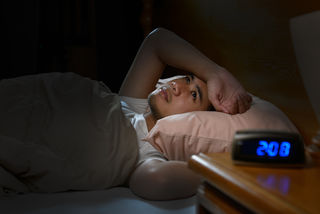Sleep
How to Improve Your Sleep During the COVID-19 Pandemic
Research shows the importance of sleep and proven methods to get better rest.
Posted May 7, 2020 Reviewed by Kaja Perina

For millions of people across the globe, change and uncertainty have become the new normal during the COVID-19 pandemic. Millions of people are experiencing its devastating consequences, including sickness, death, and job losses. It’s likely the pandemic is also causing secondary changes in our overall health and well-being, including sleep problems.
In fact, COVID-19 is a perfect storm for sleep disruptions. The vast majority of people have experienced changes in their daily schedules resulting from school closures, job losses, and work-from-home orders. Many have lost their “time anchors,” such as dropping the kids off to school, arriving at the office, or going to the gym, which help to establish daily routines. People who have lost their jobs or are working reduced hours may be sleeping later in the morning or sleeping more, which can lead to loss of focus and irritability.
Most are also experiencing anxiety and fear—about getting sick, their loved ones getting sick, or about financial hardships—which can interfere with sleep. Experiencing isolation can lead to depression, which is associated with sleep problems. For those who have lost a loved one during the pandemic, grief can also cause trouble sleeping.
In addition, people stuck at home are spending more time in front of screens. Children who are distance-learning are doing more schoolwork on computers. Checking the news, binge-watching shows, and Zooming with loved ones all increase screen time. Research shows that the blue light emitted from screens can disrupt sleep patterns.
All of these sleep disruptions are coming at a time when most people could use quality sleep more than ever before. A significant body of research demonstrates that sleep is important to keep our immune systems functioning at their highest levels. Research also shows that insomnia is linked to serious mental health disorders, including depression, anxiety, substance abuse, and psychosis.
Fortunately, there are steps you can take to improve your sleep during this stressful time. First, there is quality evidence that good sleep hygiene significantly improves sleep. There are several elements to good sleep hygiene. Establishing a regular schedule for waking and going to bed helps your mind and body prepare to sleep. Reserving your bed for sleeping only creates an association in your mind between your bed and sleep. While it may be tempting to sit in bed with your laptop to work, it’s better to find a different place, even if that’s the kitchen table or sofa.
Our exposure to light helps to regulate our sleep cycles, so spending time outside in the daylight will send a cue to your body that it’s time to be awake. And avoiding screens before bed allows your body to avoid artificial blue light, which interferes with the body’s natural sleep process.
Getting enough physical activity is another important aspect of promoting quality sleep. Lastly, avoiding alcohol and caffeine, especially later in the day, has been shown to improve sleep length and quality.
If good sleep hygiene isn’t enough, there are some proven treatments for insomnia. A large body of evidence demonstrates that cognitive-behavioral therapy is an effective treatment for insomnia. The therapy works by helping you to control or eliminate negative thoughts and worries that keep you awake and develop good sleep habits.
Another option is to consult with a doctor about medications that can help improve your sleep. A clinical practice guideline published by the American Academy of Sleep Medicine in 2017 reviews evidence for the available medicines for insomnia. In all, the guideline reviews 14 medicines approved for the treatment of chronic insomnia for adults. It recommended eight of the medicines for specific circumstances and does not recommend six others. As always, a doctor is needed to evaluate each individual patient and prescribe an appropriate medicine.
The take-home message: The coronavirus pandemic is creating a perfect storm for sleep problems. But there is clear evidence that good sleep hygiene, cognitive behavioral therapy, and some prescription medications can help.
Visit Cornell University’s Bronfenbrenner Center for Translational Research’s website for more information on our work.
LinkedIn Image Credit: Africa Studio/Shutterstock




